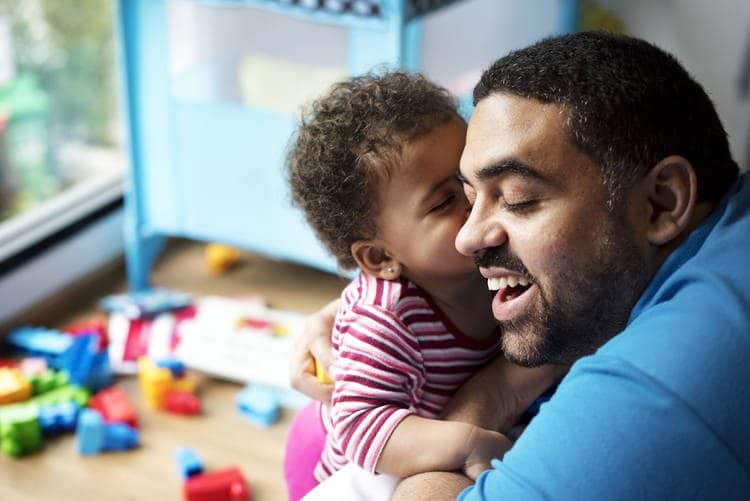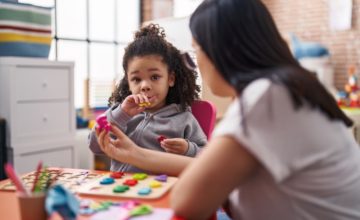Many parents worry about children being ungrateful. Here’s what you can do.
When a child demands a toy or refuses to cooperate, it can feel frustrating—like they just don’t understand how lucky they are.
Children’s demands might hit especially hard when we’re working long hours to make ends meet or just trying to get dinner on the table. We’re also reminded of how much need there is among families in our own communities and around the world. While young children can’t yet see the world from somebody else’s perspective, we can begin to build a sense of gratitude starting in the toddler years.
Here are some ideas on how to model gratitude and create family traditions that focus on values of thankfulness and generosity:
- Show appreciation to your children. Slow down and observe more closely. You’ll see things you appreciate about your kids—then tell them! Appreciation can be an even more powerful motivator than praise. Sharing appreciation is a strong way to feel connected to one another.
- Show appreciation for others. Never underestimate the power of your words and actions. Your children are paying attention to the way you treat others, whether it’s friends, neighbors, a teacher, or the cashier at the market. They hear your tone with the salesperson on the phone. You set a great example when you model kindness, generosity, and gratefulness in your own everyday interactions.
- Use the word “grateful.” Children need to learn what this new word means. Explain that being grateful is noticing something in your life that makes you happy. “I’m grateful that it’s sunny today because it was raining yesterday.” Mention gratitude when you’re doing an everyday pleasant activity, like hanging out at the playground or eating watermelon on a hot day. Pause and say, “I’m so grateful for this day!” or “Wow, this is fun!” Your enthusiasm will be contagious.
- Make a Thankful Tree. Cut a tree trunk from cardboard or construction paper. Tape to a wall or window and cut out some leaf shapes. Ask your child to think of something they are thankful for and write one on each leaf. Then tape the leaf to a branch. Add your own “thankful things.” Have your child ask family members what they’re are grateful for and add them to the tree.
- Share stories of thankfulness, gratitude, and generosity. The titles below, for children from birth to five years old, focus on different aspects of these important values:
For Children Birth to 3 Years Old:
Biscuit is Thankful by Alyssa Satin Capucilli
The Thankful Book by Todd Parr
Thanks for Thanksgiving by Julie Markes
Bear Says Thanks by Karma Wilson
Splat Says Thank You by Rob Scotton
Should I Share My Ice Cream by Mo Willems
For Children 3-5 Years Old:
Thankful by Eileen Spinelli
Being Thankful by Mercer Mayer
Ordinary Mary’s Extraordinary Deed by Emily Pearson
Did I Ever Tell You How Lucky You Are? by Dr. Seuss
Giving Thanks by Jonathon London
Don’t Say a Word, Mama/No Digas Nada, Mama by Joe Hayes
- Share “Roses and Thorns.” Even young children can talk about what went well (roses) and what was hard about each day (thorns). It gives them, and you too, a chance to vent a frustration and focus on what is good in life.
- Emphasize presence over presents. Some people pull off the “no gifts” approach to their children’s birthday parties. (The key is to start very young!) An alternative approach is to opt for a book swap or ask for donations to a local food bank or animal shelter. You can also make it a habit to give the gift of time and activities—like a birthday picnic and trip to a local park—as opposed to “stuff.”
- Talk openly about donations and other “good deeds.” You don’t have to have a lot of money to make a difference. If you have money in your budget to donate to a favorite cause, share this giving with your children: “We’re giving some money to help animals that don’t have homes.” Keep explanations simple and matter-of-fact. As children grow up, they will eventually see that helping and giving are part of your family’s culture.
- Fostering feelings of gratitude can transform our outlook on life. Gratitude helps us focus more on the good news in our lives. But like anything else, gratitude requires practice. Sharing appreciations when we feel them and actively looking for things that make us happy can “retrain” our brains toward these attitudes of gratitude. Being grateful offers a new perspective, one that will help you see the best in your kids and the world, and will teach them to do the same.






